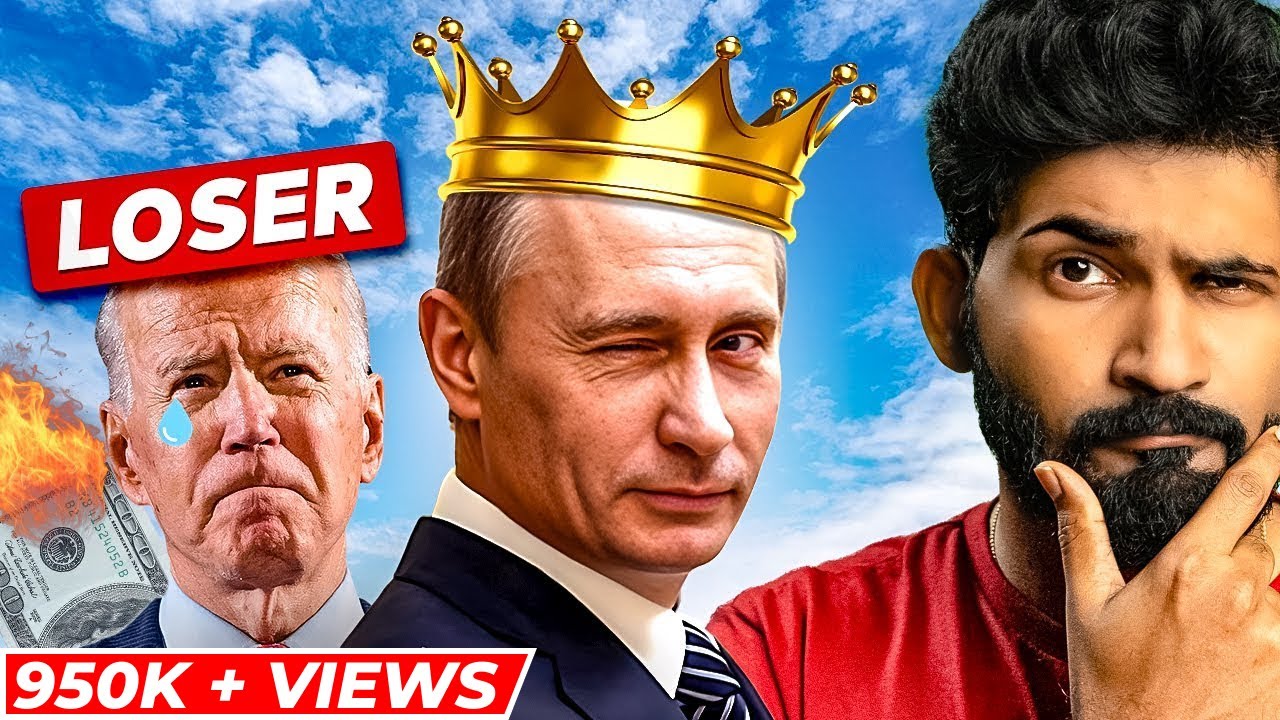The Biggest Alliance That Could Destroy America Today
Summary
TLDRThe script discusses the geopolitical shifts resulting from the Ukraine-Russia war, highlighting how Western sanctions on Russia led to unintended consequences like strengthening Russia's economy and fostering closer ties with countries like China, Iran, and India. The U.S. sanctions have also prompted nations to diversify away from the U.S. dollar and American banks, fearing similar financial repercussions. The speaker emphasizes how alliances are shifting, with countries prioritizing pragmatic trade relationships over ideological alignments, and raises concerns about the long-term global impact of these economic and diplomatic changes.
Takeaways
- 🌍 The conflict in the Middle East is primarily shaped by the competition between Iran and Saudi Arabia, representing Shia and Sunni powers respectively.
- 🤝 China brokered an unprecedented diplomatic agreement between Iran and Saudi Arabia in 2023, marking a significant shift in their relations.
- ⚔️ The ongoing Ukraine-Russia war has led to global economic repercussions, particularly boosting Russia's economy due to sanctions imposed by the West.
- 💸 Russia's exclusion from Western markets has allowed it to strengthen ties with China, Iran, and India, selling oil and resources to these nations.
- 🇮🇳 India, while allied with the U.S., continues to pragmatically purchase Russian oil due to its cheaper cost and proximity, highlighting complex global alliances.
- 💡 The U.S. and NATO sanctions on Russia have helped solidify an economic and ideological resistance block, including nations like North Korea, China, Russia, and Iran.
- 🤔 Several developing nations, like India and Pakistan, are prioritizing practical benefits over ideological alignment with Western powers.
- 🔔 Global supply chain disruptions, especially during COVID-19, underscored the dependency on China, leading many nations to rethink their trade strategies.
- 💰 The seizing of Russian assets by U.S. banks has prompted many countries to diversify their reserves and move away from reliance on the U.S. dollar.
- 🧐 Countries are increasingly wary of placing their assets in American banks, fearing that geopolitical tensions could result in asset freezes or seizures.
Q & A
What is the main competition in the Middle East according to the script?
-The main competition in the Middle East is between Iran and Saudi Arabia, reflecting a Sunni-Shia rivalry.
What was significant about China's diplomatic agreement between Iran and Saudi Arabia in 2023?
-China brokered an agreement for Iran and Saudi Arabia to work together diplomatically, which was unprecedented, as the two countries had never recognized each other diplomatically before 2023.
How did the sanctions imposed by the West on Russia after the Ukraine invasion impact Russia economically?
-The sanctions boosted the value of the Russian currency and allowed Putin to position the war as not just against Ukraine, but against the West and NATO. It also opened up opportunities for Russia to sell more resources, like oil, to developing nations such as China, Iran, and India.
Why is India in a complex position regarding its relationship with Russia and the U.S.?
-India is a U.S. ally but operates pragmatically due to its growing population and need for resources. Russian petrol is cheaper and more accessible, leading India to continue buying from Russia despite sanctions from the West.
What is the 'proximity effect' described in the script regarding Russia, China, and Iran?
-The 'proximity effect' refers to the increasing collaboration among nations that are geographically closer, ideologically independent, and share a common adversary (the U.S.), such as Russia, China, Iran, and others like North Korea.
Why did several countries begin moving their financial assets away from U.S. banks?
-Countries started diversifying their portfolios away from U.S. banks after realizing that the U.S. could freeze or seize assets, as demonstrated by its actions against Russia during the Ukraine invasion.
What was the global reaction to the U.S. freezing and seizing Russian assets in sovereign banks?
-Many countries saw this as a warning that the U.S. could potentially do the same to them, leading them to shift their financial holdings out of U.S. banks and diversify into other currencies and financial systems.
What was China's strategic focus during the global war on terror (GWOT)?
-While the U.S. and its allies were engaged in the global war on terror, China focused on building economic ties globally through trade and manufacturing rather than participating in the conflict.
How has the Ukraine-Russia war affected global alliances and trade relationships?
-The war has led to a reshaping of alliances, with countries like China, Iran, and India cooperating more closely with Russia and distancing themselves from the U.S. due to pragmatic trade relationships and distrust of U.S. financial policies.
What key lesson did developing nations learn from the U.S.'s handling of Russian assets post-Ukraine invasion?
-Developing nations learned that the U.S. could freeze or seize assets if a country is in opposition, prompting them to move away from reliance on the U.S. financial system.
Outlines

هذا القسم متوفر فقط للمشتركين. يرجى الترقية للوصول إلى هذه الميزة.
قم بالترقية الآنMindmap

هذا القسم متوفر فقط للمشتركين. يرجى الترقية للوصول إلى هذه الميزة.
قم بالترقية الآنKeywords

هذا القسم متوفر فقط للمشتركين. يرجى الترقية للوصول إلى هذه الميزة.
قم بالترقية الآنHighlights

هذا القسم متوفر فقط للمشتركين. يرجى الترقية للوصول إلى هذه الميزة.
قم بالترقية الآنTranscripts

هذا القسم متوفر فقط للمشتركين. يرجى الترقية للوصول إلى هذه الميزة.
قم بالترقية الآنتصفح المزيد من مقاطع الفيديو ذات الصلة

Putin's SMART move can destroy US Dollar | De-dollarization | Abhi and Niyu

Modi Visit to Russia | Modi Putin Meet | SU-57 | Floating Nuclear Plant | India-Russia Nuclear Deal

How long can Putin afford to wage war in Ukraine? | DW News

Atualidades 2025 - A expansão dos BRICS e a integração do Sul Global

Russia Surprise | Big Breaking | Details by Syed Ali Haider

India in the List of GLOBAL POWERS says Putin | Europe does not have Brains | By Prashant Dhawan
5.0 / 5 (0 votes)
